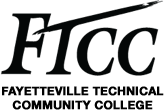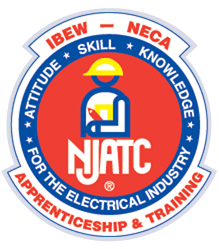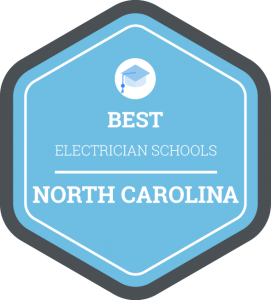If you live in North Carolina and you’re contemplating the idea of starting a career in the electricity field, this page will present you with information about the top training options available in the region.
This trade can be learned during high school, if shop classes are available or after graduation through a post-secondary degree or certificate program.
Apprenticeships that allow trainees to earn a salary while preparing for a new career are also available and take between four and five years to complete.
We invite you to read further and find out more about the electrician training schools available in North Carolina.
1Carolinas Electrical Training Institute

About the School
Carolinas Electrical Training Institute offers apprenticeship programs for those who want to start a career in the electrician trade.
The four-year program combines on-the-job and classroom training.
During this time, apprentices are assigned to an electrical contractor for 8,000 hours of on-the-job training.
Classes are currently offered one day per week and take place at Carolinas Electrical Training Institute in Charlotte, NC.
Inside wiremen are the ones who install conduit systems from motor control centers or panel boards to equipment that uses electricity.
During the apprenticeship period, students learn how to perform tasks such as:
- Wiring of residences, duplexes, and small apartment buildings
- Wiring of public, commercial, school, and hospital buildings
- Wiring of all industrial buildings and equipment
Apprentices earn a salary that is based on a percentage of the prevailing inside electrician journeyman rate and they also earn benefits.
An OSHA-10 continuing education class is also available.
This course teaches the basics of construction safety and emphasizes hazard recognition in the workplace.
Contact Information
- Address: 13530 South Ridge Drive Charlotte NC 28273
- Phone: (704) 523-7001
- Website: http://carolinaseti.org
2Durham Tech Community College
About the School
Durham Tech Community College offers educational programs that prepare students for careers in a wide range of industries.
The college also provides dual enrollment programs for eligible high school students who want to earn high school and college credits.
Tuition for residents of North Carolina is $76 per credit hour.
Durham Tech is accredited by the Southern Association of Colleges and Schools Commission on Colleges to award associate degrees, diplomas, and certificates.
Courses Offered
The college’s catalog includes a Building, Engineering, & Skilled Trades program.
This program provides pathways in:
- Automotive Systems Technology- Electrical Certificate- a short-term program that can be completed in only two semesters
- Electric Line Technician- this program includes a 10-week Electric Line course and an online CDL permit course
- Electrical Systems Technology- Construction Electrician- a short-therm program that covers topics on AC/DC theory, basic wiring practices, programmable logic controllers, industrial motor controls, applications of the National Electric Code, and other related subjects.
- Electrical Systems Technology- Control Electrician
- Electrical Systems Technology- Diploma
- Electrical Systems Technology- Maintenance Electrician
- Electrical Systems Technology- a Long term program
- And more
Contact Information
- Address: 1637 East Lawson Street, Durham, NC 27703
- Phone: 919-536-7200
- Website: https://www.durhamtech.edu
3McDowell Tech Community College

About the School
McDowell Tech Community College provides more than 100 different degrees, certifications, and diploma programs.
In-state tuition is $76 per credit hour.
The maximum tuition charge for 16 or more credit hours is $1,216.
McDowell Tech Community College is accredited by the Southern Association of Colleges and Schools Commission on Colleges to award associate degrees.
Dual credit programs are also available to allow North Carolina students to earn college credit for free while in high school.
Courses Offered
The college’s catalog includes an Electrical Systems Technology pathway that can lead to an Associate in Applied Science, a Diploma, or a Certificate.
The curriculum prepares students for careers in the installation and maintenance of electrical systems in residential, commercial, and industrial settings.
Students take classes on AC/DC theory, basic wiring practices, programmable logic controllers, industrial motor controls, applications of the National Electrical Code, and other topics.
Graduates are ready for entry-level employment in the electrical field as on-the-job trainees or apprentices.
Contact Information
- Address: 54 College Drive, Marion, NC 28752
- Phone: 828-652-6021
- Website: https://mcdowelltech.edu
4Asheville-Buncombe Technical Community College

About the School
Asheville-Buncombe Technical Community College provides educational programs in a variety of industries.
The college is accredited by the Southern Association of Colleges and Schools Commission on Colleges to award associate degrees, diplomas, and certificates.
Tuition for North Carolina residents is $76 per credit.
Courses Offered
The college’s catalog includes an Electrical Systems Technology program.
The program provides students with knowledge of electrical and electro-mechanical systems installation, repair, and maintenance.
The following degree and certificate options are available:
- Electrical Systems Technology A.A.S.- a 76-credit program
- Electrical Systems Technology Diploma- a 39-credit program
- Electrical Systems Technology Building Instrumentation & Control Certificate- a 17-credit program
- Electrical Systems Technology Electrical Wiring Certificate- a 13-credit program
The curriculum varies depending on the program.
Students in the Associate in Applied Science program take classes such as:
- Introduction to Engineering Tech
- Introduction to Electricity
- Residential Wiring
- Industrial Wiring
- Fabrication Techniques
- Motors and Controls
- Circuit Analysis I Lab
- Digital Electronics
- Analog Electronics
- Instrumentation
- PLC Applications
- And more
Contact Information
- Address: 340 Victoria Road, Asheville, North Carolina 28801 USA
- Phone: (828) 398-7900
- Website: https://abtech.edu
5Fayetteville Technical Community College

About the School
Fayetteville Technical Community College offers a variety of programs of study.
More than 280 associate degrees, diplomas, and certificates are available in science, applied science, the arts, and general education.
University transfer programs are also an option for those who want to continue with a four-year university.
Fayetteville Technical Community College is accredited by the Southern Association of Colleges and Schools Commission on Colleges to award associate degrees, diplomas, and certificates.
Courses Offered
The college’s catalog includes an Electrical Systems Technology program.
This program is designed to provide students with training in the field of installation and maintenance of electrical systems in residential, commercial, and industrial facilities.
The curriculum covers topics on:
- AC/DC theory
- Basic wiring practices
- Programmable logic controllers
- Industrial motor controls
- Applications of the National Electric Code
- And more
The following degree and certificate options are available:
- Electrical Systems Technology
- Electrical Systems Technology Diploma
- Basic Electricity, Motors, and Controls & PLC Certificate
- High School Connections: Basic Electricity, Motors and Controls, & PLC Certificate
- High School Connections: Introduction to Photovoltaic Systems Certificate
Contact Information
- Address: 2201 Hull Rd, Fayetteville, NC 28303
- Phone: (910) 678-8400
- Website: https://www.faytechcc.edu
6Forsyth Tech Community College
About the School
Forsyth Tech Community College provides degree, diploma, and certificate programs that prepare students for employment in a variety of industries.
College transfer, continuing education, corporate training, and many other types of programs are also available at the college.
In-state tuition is $76 per semester hour.
Forsyth Tech is accredited by the Southern Association of Colleges and Schools Commission on Colleges.
Courses Offered
The college’s catalog includes an Electrical Systems Technology pathway designed for those who want to start a career in the installation and maintenance of electrical/electronic systems found in residential, commercial, and industrial settings.
A diploma and a certificate option are available.
The curriculum covers topics on:
- AC/DC Theory
- Basic Wiring Practices
- Digital Electronics
- Programmable Logic Controllers
- Industrial Motor Controls
- National Electric Code
- And more
Students also learn print reading in construction, mathematical measurement and literacy, quantitative literacy, and other useful skills.
The diploma program includes 39 credits in total while the Certificate program includes 15 total credit hours.
Contact Information
- Address: 2100 Silas Creek Parkway, Winston-Salem, NC 27103
- Phone: 336.723.0371
- Website: https://www.forsythtech.edu
7Cleveland Community College

About the School
With more than 50 years of activity, Cleveland Community College offers programs for students who want to finish a high school degree, transfer to a four-year school, earn a diploma, degree, or certificate, or simply learn a new trade.
Cleveland Community College is accredited by the Southern Association of Colleges and Schools Commission on College.
In-state tuition is $76 per credit hour for 1-15 hours.
For more than 16 credit hours in-state students pay $1,216.
Courses Offered
Cleveland Community College offers an Electrical Lineworker Academy and an Electrical Systems Technology pathway, among many other programs.
The Electrical Systems Technology path can lead to an Associate in Applied Science, a Certificate, or a Diploma.
The A.A.S. curriculum includes courses such as:
- Residential Wiring
- Commercial Wiring
- Motors and Controls
- Circuit Analysis
- Intro to Refrigeration
- Instrumentation
- Critical Power Systems
- Home Automation Systems
- And more
The program includes 51 total major hours.
The Certificate requires 13 credit hours for graduation.
The Diploma includes 31 total major hours.
Contact Information
- Address: 137 South Post Rd. Shelby, NC 28152
- Phone: (704) 669-6000
- Website: https://clevelandcc.edu
8Wake Technical Community College

About the School
The largest community college in North Carolina, Wake Tech serves more than 70,000 adults annually at its seven campuses, two training centers, and multiple community sites.
More than 250 associate degrees, diplomas, and certificates are available to prepare students for university transfer or immediate employment.
Wake Technical Community College is accredited by the Commission on Colleges of the Southern Association of Colleges and Schools.
Courses Offered
The college’s catalog includes an Electrical Systems Technology program that can lead to an Associate in Applied Science, Diploma, or Certificate.
Students who attend certificate courses learn about the installation and maintenance of electrical systems in residential and commercial applications.
The program includes classes on the National Electrical Code requirements.
Diploma courses also cover topics such as industrial applications, DC and AC electrical theory, electrical calculations, operation of motors and motor controls, programmable logic controllers, transformer applications, and renewable energy.
In addition, students need six hours of general education before earning a diploma.
The A.A.S curriculum also includes electrical estimating and photovoltaic systems, as well as 16 hours of general education.
Contact Information
- Address: 9101 Fayetteville Road, Raleigh, North Carolina 27603
- Phone: 919-866-5000
- Website: https://www.waketech.edu
9Randolph Community College

About the School
Randolph Community College provides a variety of majors, college transfer options, online programs, and opportunities for high school students.
In-state tuition and fees sum up to $2,396 for 2022-2023.
The college is accredited by the Southern Association of Colleges and Schools Commission on Colleges.
Courses Offered
The Randolph Community College catalog includes an Electrical Systems Technology pathway that can lead to an Associate Degree, Diploma, or Certificate.
The coursework is mostly hands-on and covers topics on AC/DC theory, basic wiring practices, programmable logic controllers, industrial motor controls, applications of the National Electric Code, and other related topics.
Graduates are ready for a variety of jobs in the electrical field, performing or assisting in layout, installation, and maintenance processes.
The Diploma requires 41 credits.
A Wiring Certificate is also available and requires 18 credits of classes on topics such as:
- Residential Wiring
- Intro to Wiring
- Diagrams and Schematics
- DC/AC Electricity
- Industrial Wiring
Contact Information
- Address: 629 Industrial Park Avenue, Asheboro, NC 27205
- Phone: 336-633-0200
- Website: https://www.randolph.edu
10Raleigh/Durham Electrical Joint Apprenticeship & Training Committee

About the School
Raleigh/Durham Electrical Joint Apprenticeship & Training Committee offers elite training and educational opportunities in the electrical industry.
An apprenticeship program that combines classroom with in-person training is available.
The four-year curriculum covers topics on electrical theory, the National Electrical Code, and OSHA safety regulations.
Students learn hands-on about AC theory, blueprints, instrumentation, motors, DC theory, digital electronics, safety, fire alarms, programmable logic controllers, and many other topics.
Apprentices must complete at least 900 curriculum hours and 8,000 hours of work-based learning.
They are required to pass written and hands-on exams.
After completing the program apprentices receive state and national certification as Journey-Level workers.
Graduates also receive the North Carolina Department of Community Colleges completion certificate and the National J.A.T.C. completion certificate.
During the apprenticeship, trainees receive salary and benefits such as health care, retirement, and education.
The salary increases gradually as students advance in their training.
Contact Information
- Address: PO Box 3869, Durham, NC 27702
- Phone: 919-237-9390
- Website: https://raldurjatc.org
Regional Salary in North Carolina
| Region | Employed | Avg. Annual Salary | Avg. Hourly Pay | Top 10% Annual Salary | Bottom 10% Annual Salary |
|---|---|---|---|---|---|
| Asheville, NC | 770 | $48,670 | $23.4 | $61,660 | $34,330 |
| Burlington, NC | 310 | $48,020 | $23.09 | $60,020 | $35,360 |
| Charlotte-Concord-Gastonia, NC-SC | 7,150 | $52,050 | $25.03 | $62,920 | $37,710 |
| Durham-Chapel Hill, NC | 1,090 | $56,610 | $27.22 | $75,450 | $37,910 |
| Fayetteville, NC | 480 | $49,420 | $23.76 | $63,360 | $34,330 |
| Goldsboro, NC | 110 | $48,460 | $23.3 | $61,490 | $30,630 |
| Greensboro-High Point, NC | 2,420 | $50,870 | $24.46 | $60,610 | $36,990 |
| Greenville, NC | 470 | $48,450 | $23.29 | $58,920 | $35,750 |
| Hickory-Lenoir-Morganton, NC | 580 | $47,120 | $22.65 | $59,700 | $35,330 |
| Jacksonville, NC | 180 | $48,720 | $23.42 | $63,440 | $35,500 |
| New Bern, NC | 110 | $50,130 | $24.1 | $70,160 | $34,750 |
| Raleigh, NC | 3,160 | $51,400 | $24.71 | $61,440 | $37,500 |
| Rocky Mount, NC | 210 | $47,300 | $22.74 | $62,150 | $31,420 |
| Wilmington, NC | 510 | $48,430 | $23.28 | $60,800 | $35,980 |
| Winston-Salem, NC | 1,250 | $49,480 | $23.79 | $60,510 | $35,730 |
* Employment conditions in your area may vary.
Final Thoughts
North Carolina provides plenty of training options for those who want to start a career in the electrician trade.
Now that you have read our list of best electrician schools in North Carolina, the next step is to continue the research and choose the program that best fits your needs.






